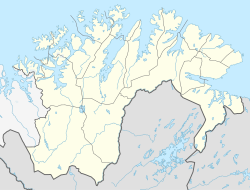Kirkenes Church
| Kirkenes Church | |
|---|---|
| Kirkenes kirke | |

View of the church
|
|
| Coordinates: 69°43′42″N 30°02′39″E / 69.728278°N 30.044083°E | |
| Location | Sør-Varanger, Finnmark |
| Country | Norway |
| Denomination | Church of Norway |
| Churchmanship | Evangelical |
| Architecture | |
| Status | Parish church |
| Functional status | Active |
| Architect(s) | Sofus Hougen |
| Completed | 1959 |
| Specifications | |
| Capacity | 275 |
| Materials | Concrete |
| Administration | |
| Parish | Sør-Varanger |
| Deanery | Varanger prosti |
| Diocese | Diocese of Nord-Hålogaland |
Kirkenes Church (Norwegian: Kirkenes kirke) is the main parish church in Sør-Varanger Municipality, Finnmark county, Norway, ecclesiastically a part of the Sør-Varanger parish in the Varanger deanery of the Diocese of Nord-Hålogaland. It is located in the town of Kirkenes, just off the European route E6 highway.
In 1857, it was decided that a church should be built on the southern side of the Varangerfjorden. After some discussion about the exact location to build on, planners settled on a site on the Piselvnes peninsula (Pis River headland) at the mouth of the Pasvikelva river where it meets the Bøkfjorden. The parish was named Sydvaranger (meaning South-Varanger), and after the church was built its site was renamed Kirkenes (church headland), from which the present-day town received its name.
The first church building was completed in 1862. It stood almost until the end of World War II, when in 1944 it was subjected to heavy bombing and burned to the ground. The old church spire survived, though, and was incorporated into its replacement.
Rebuilding took fifteen years. The architectural drawings by Sofus Hougen followed a traditional "long plan" design, in the form of a basilica, divided longitudinally into three sections by columns and rows, with a raised central peak and tower raised over the choir. As was common to two-thirds of post-war church construction in Norway, reinforced concrete bricks were used as a principal material, along with wood fashioned by modern milling techniques. Interior decoration and furnishings reflect a traditional strongly sacred character. The present church building was finally completed in 1959; it seats about 275 people.
...
Wikipedia


